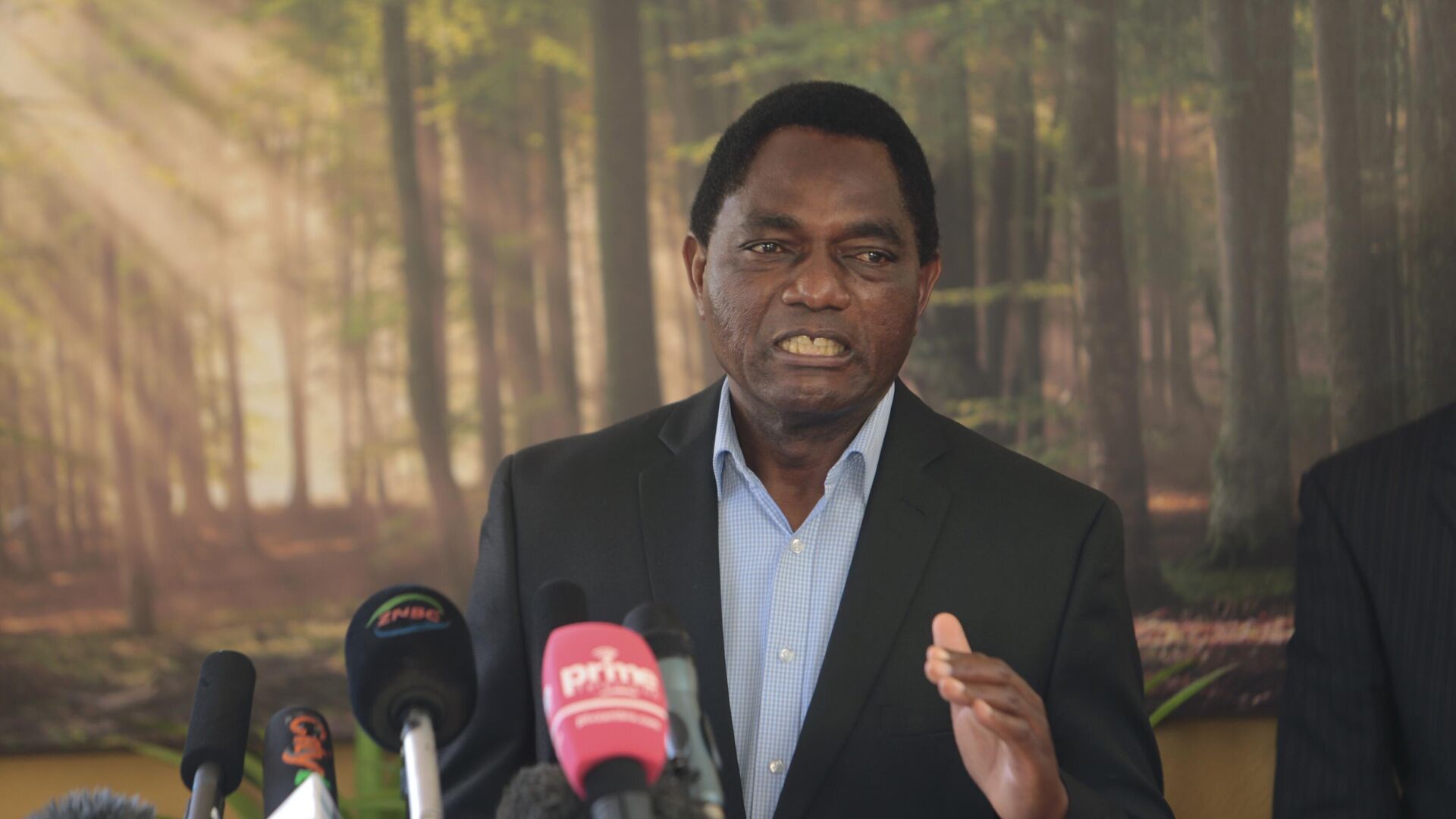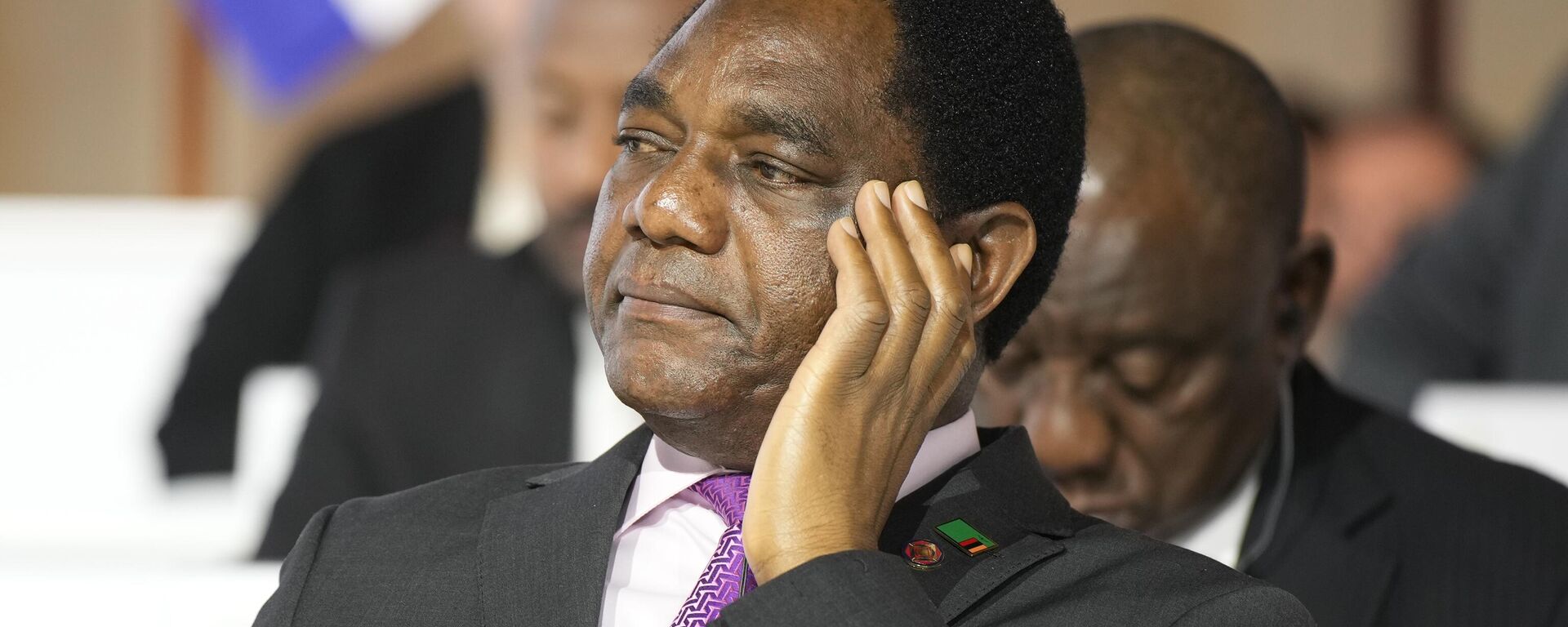https://en.sputniknews.africa/20240301/zambian-president-declares-state-of-emergency-due-to-prolonged-drought-1065331949.html
Zambian President Declares State of Emergency Due to Prolonged Drought
Zambian President Declares State of Emergency Due to Prolonged Drought
Sputnik Africa
MOSCOW (Sputnik) - According to the United Nations, Africa is the continent most vulnerable to the effects of climate change, including increased droughts... 01.03.2024, Sputnik Africa
2024-03-01T09:33+0100
2024-03-01T09:33+0100
2024-03-01T09:33+0100
sub-saharan africa
zambia
drought
climate change
climate
un central emergency response fund (uncerf)
emergency
world food crisis
energy crisis
southern africa
https://cdn1.img.sputniknews.africa/img/07e8/03/01/1065332051_0:0:3072:1728_1920x0_80_0_0_e15309843858a458ef0d170d9921b0ae.jpg
Zambia has declared a state of emergency and national disaster due to a prolonged drought caused by El Niño natural phenomenon, Zambian President Hakainde Hichilema said on Thursday.The prolonged drought has already affected 84 out of 116 districts in seven provinces of Zambia, destroyed one million hectares of maize and impacted one million farming households. Apart from that, the country is experiencing significant power shortages due to the ongoing drought, Hichilema said in a separate post.The drought affecting Zambia is just one part of a wider regional crisis, as numerous countries in Southern Africa are grappling with severe drought due to the worsening El Niño weather pattern and harsh weather conditions linked in part to climate change. The World Food Program has reported that parts of Zambia, Zimbabwe, and Botswana are facing the driest February in the last 40 years, while significant rainfall shortages have been observed in southern Malawi, eastern Angola, and some areas of Mozambique.
https://en.sputniknews.africa/20240216/zambia-to-adjust-budget-to-ensure-food-security-amid-drought-1065109642.html
zambia
southern africa
Sputnik Africa
feedback@sputniknews.com
+74956456601
MIA „Rossiya Segodnya“
2024
Sputnik Africa
feedback@sputniknews.com
+74956456601
MIA „Rossiya Segodnya“
News
en_EN
Sputnik Africa
feedback@sputniknews.com
+74956456601
MIA „Rossiya Segodnya“
Sputnik Africa
feedback@sputniknews.com
+74956456601
MIA „Rossiya Segodnya“
zambia, drought, climate change, climate, un central emergency response fund (uncerf), emergency, world food crisis, energy crisis, southern africa, disaster, natural disaster, monitoring disasters
zambia, drought, climate change, climate, un central emergency response fund (uncerf), emergency, world food crisis, energy crisis, southern africa, disaster, natural disaster, monitoring disasters
Zambian President Declares State of Emergency Due to Prolonged Drought
MOSCOW (Sputnik) - According to the United Nations, Africa is the continent most vulnerable to the effects of climate change, including increased droughts, floods, heat waves, desertification and rising sea levels, despite being the continent with the lowest contribution to global carbon emissions.
Zambia has declared a state of emergency and national disaster due to a prolonged
drought caused by El Niño natural phenomenon, Zambian President Hakainde Hichilema said on Thursday.
"With heavy hearts, we've declared a national disaster & emergency as our country faces severe drought, caused by El Niño weather phenomenon, influenced by climate change. The prolonged dry spell has impacted both Zambia's food & energy security that are our key priorities," Hichilema said on X.
The prolonged drought has already affected 84 out of 116 districts in seven provinces of Zambia, destroyed one million hectares of maize and impacted one million farming households. Apart from that, the country is experiencing significant power shortages due to the ongoing drought, Hichilema said in a separate post.
The drought affecting Zambia is just one part of a wider regional crisis, as numerous countries in Southern Africa are grappling with severe drought due to the worsening El Niño
weather pattern and harsh weather conditions linked in part to climate change.
The World Food Program has reported that parts of Zambia, Zimbabwe, and Botswana are facing the driest February in the last 40 years, while significant rainfall shortages have been observed in southern Malawi, eastern Angola, and some areas of Mozambique.


